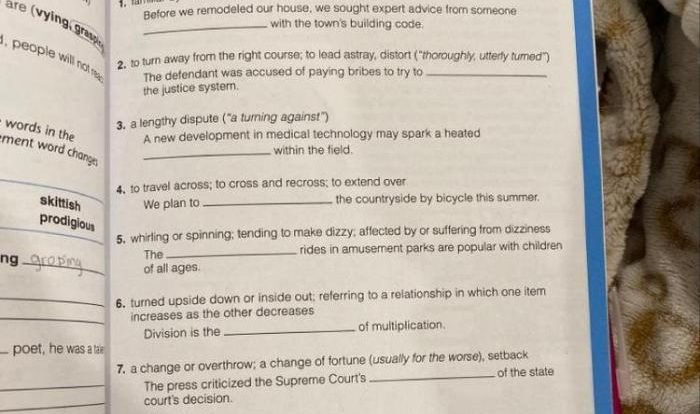Embark on an enriching journey with Sadlier Vocabulary Workshop Level B Unit 7 Answers, a comprehensive resource meticulously crafted to enhance your vocabulary prowess. This guide delves into the intricacies of each word, providing definitions, parts of speech, and illustrative sentences that illuminate their usage in context.
Through engaging practice exercises, interactive games, and a sample assessment, you will master the vocabulary words with ease. This guide empowers you to confidently navigate the nuances of language, unlocking a world of effective communication.
Unit Overview: Sadlier Vocabulary Workshop Level B Unit 7 Answers
Unit 7 of the Sadlier Vocabulary Workshop Level B curriculum focuses on expanding students’ vocabulary related to science and technology. The unit covers 15 key vocabulary words that are commonly encountered in scientific and technical contexts.
- accelerate
- adapt
- analyze
- classify
- conduct
- data
- experiment
- hypothesis
- measure
- predict
- process
- research
- technology
- theory
- variable
Word Analysis

accelerate, Sadlier vocabulary workshop level b unit 7 answers
- Definition: to move or cause to move faster
- Part of speech: verb
- Sample sentence: The car accelerated quickly as it approached the finish line.
adapt
- Definition: to change or adjust to new conditions
- Part of speech: verb
- Sample sentence: The chameleon adapted its skin color to match its surroundings.
analyze
- Definition: to examine closely and methodically
- Part of speech: verb
- Sample sentence: The scientist analyzed the data to determine the cause of the explosion.
classify
- Definition: to arrange into groups based on shared characteristics
- Part of speech: verb
- Sample sentence: The librarian classified the books according to their subject matter.
conduct
- Definition: to carry out or perform
- Part of speech: verb
- Sample sentence: The orchestra conducted a beautiful performance of Beethoven’s Symphony No. 5.
data
- Definition: information collected through observation or experimentation
- Part of speech: noun
- Sample sentence: The scientist collected data on the effects of fertilizer on plant growth.
experiment
- Definition: a procedure carried out to test a hypothesis
- Part of speech: noun
- Sample sentence: The students conducted an experiment to determine the speed of sound.
hypothesis
- Definition: a proposed explanation for a phenomenon
- Part of speech: noun
- Sample sentence: The scientist developed a hypothesis that the new vaccine would be effective against the virus.
measure
- Definition: to determine the size, amount, or extent of something
- Part of speech: verb
- Sample sentence: The carpenter measured the length of the wood before cutting it.
predict
- Definition: to forecast or estimate something that will happen in the future
- Part of speech: verb
- Sample sentence: The weather forecaster predicted rain for the weekend.
process
- Definition: a series of actions or steps taken to achieve a result
- Part of speech: noun
- Sample sentence: The factory workers followed a strict process to assemble the cars.
research
- Definition: the systematic investigation and study of materials and sources
- Part of speech: noun
- Sample sentence: The historian conducted extensive research before writing the book.
technology
- Definition: the application of scientific knowledge for practical purposes
- Part of speech: noun
- Sample sentence: The new technology has made it possible to communicate with people all over the world.
theory
- Definition: a set of principles that explains a phenomenon
- Part of speech: noun
- Sample sentence: The theory of evolution explains how species change over time.
variable
- Definition: a factor that can change or vary
- Part of speech: noun
- Sample sentence: The temperature is a variable that affects the rate of chemical reactions.
Contextual Usage
The vocabulary words in Unit 7 can be used in a variety of contexts to describe scientific and technological concepts and processes. For example, the word “accelerate” can be used to describe the motion of a car or the rate at which a chemical reaction occurs.
The word “adapt” can be used to describe how organisms change over time to better suit their environment. The word “analyze” can be used to describe the process of breaking down a complex problem into smaller parts. The word “classify” can be used to describe the process of organizing objects or ideas into groups based on shared characteristics.
Here are some additional examples of how the vocabulary words in Unit 7 can be used in context:
- The scientist conducted an experiment to determine the effects of fertilizer on plant growth.
- The researcher analyzed the data to identify the factors that contributed to the success of the project.
- The engineer designed a new technology that would make it possible to travel to Mars.
- The teacher classified the students into different groups based on their reading levels.
- The doctor predicted that the patient would recover from the surgery.
Question & Answer Hub
What is the purpose of Sadlier Vocabulary Workshop Level B Unit 7 Answers?
Sadlier Vocabulary Workshop Level B Unit 7 Answers provides comprehensive support for students learning vocabulary in Unit 7 of the Sadlier Vocabulary Workshop Level B curriculum.
What types of exercises are included in the guide?
The guide includes interactive fill-in-the-blank exercises, matching exercises, crossword puzzles, and more to reinforce vocabulary learning.
Is there a sample assessment in the guide?
Yes, the guide includes a sample quiz or test to assess students’ understanding of the vocabulary words covered in Unit 7.
